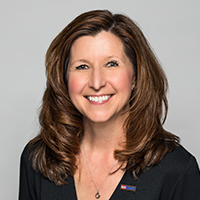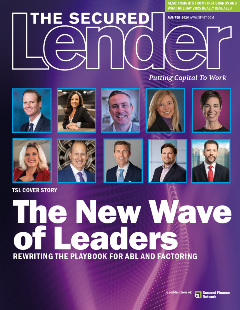
Lisa Freeman
SVP, US Bank
Lisa Freeman is a senior vice president and has over 25 years of experience in the asset-based lending industry. After spending 20 years at Bank of America and its predecessors, she took a leadership position at US Bank focused on the mid-Corporate Asset Based Finance space, where she’s been for almost nine years. She is currently a Team Leader located in Hartford, CT and leads a team of six portfolio managers and a credit analyst, with over $4 billion in loan commitments and a primary focus in deal sizes ranging from $150 million to $500 million. As a Team Leader, she has guided her team through various aspects of corporate lending, from single-lender deals to syndicated facilities involving multiple lenders, with varying degrees of risk and complexity. Lisa’s experience spreads across a multitude of industries in the ABL and retail space, working with investment-grade clients as well as struggling performers as they navigate through the ups and downs that are unique to their specific industries. She works closely with her team, customers and multiple partners throughout US Bank to formulate strategies on how to underwrite risk, expand relationships and meet customer needs.
What advice would you offer to women just starting out in the industry?
There’s probably two pieces of advice that I would give to women just starting out in their careers. First and most importantly, always remember to be your own biggest advocate. Even with a great manager, it’s very important for you to “own” the responsibility for advancing your own career. Always keep your eyes open to take on more responsibilities, actively seek out ways to add value, ask a lot of questions, build/form relationships outside of your direct working group, essentially be the best at your job that you can be, so when there is a new, bigger or better opportunity that opens up, you are a strong candidate for the job. And during that interview, you can talk about all of the additional responsibilities that you took on, how you showed leadership and took initiative well beyond your current job responsibilities that makes you the best candidate for that new role.
Secondly, I would recommend that women have a “sounding board” to talk to about any important decisions and/or interactions, before they happen. Most people call it a mentor but to me it doesn’t have to be that formal of a relationship; it could be an older brother or a close friend, but definitely someone who is in the business world who can listen to the issue and give valuable feedback on how you are approaching it. Over the years, you will likely be faced with difficult decisions and/or uncomfortable conversations and, if you have that person to talk through what you’re going to say or how you’re going to handle it, that could make a very big difference in how the issue gets resolved and how you are perceived by your colleagues and management. We need to remember that we can’t always be as good of a communicator as we want to be or that we think we are, so having that sounding board can really make a big difference.
How do you balance work/personal time?
This is a tough one because I don’t think I always do a very good job of balancing my work and personal time, especially since we’ve been working from home these past several months. One of the things I try to do is schedule myself for an hour every day – I literally block the time out of my calendar so no one can schedule a meeting during that time. During that hour, I try to leave my workspace to run an errand, sit outside and enjoy the fresh air or even meet a friend for a walk, anything to get myself away from my computer in the middle of the day. It doesn’t always happen with everything that’s been going on, but I do try to walk away for some period of time during the workday, which is helpful. Another thing I try to do, particularly on my vacation and on weekends, is to turn off the email notifications on my phone. When I hear that “ping”, it’s very tempting for me to peak at an email and then respond with a quick answer and I think that’s ok, sometimes, it’s part of the job, but then oftentimes I get sucked into the rest of my emails, which can really take up more time than I intended. By turning my notifications off, I can respond to emails/issues late in the day or at my convenience, without feeling like I’m sacrificing too much of my personal time.
The Secured Lender

SFNet's The Year Ahead Issue


